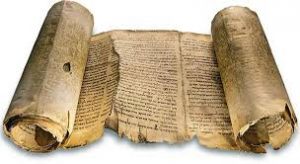
Wisdom-Trek / Creating a Legacy
Welcome to Day 1101 of our Wisdom-Trek, and thank you for joining me.
I am Guthrie Chamberlain, Your Guide to Wisdom
Who Determined the Canon of Scripture? – Wisdom Wednesday

Wisdom – the final frontier to true knowledge. Welcome to Wisdom-Trek! Where our mission is to create a legacy of wisdom, to seek out discernment and insights, and to boldly grow where few have chosen to grow before.
Hello, my friend, I am Guthrie Chamberlain, your captain on our journey to increase wisdom and create a living legacy. Thank you for joining us today as we explore wisdom on our 2nd millennium of podcasts. This is Day 1101 of our trek, and it is Wisdom Wednesday. Creating a Biblical worldview is important to have a proper perspective on today’s current events.
To establish a Biblical worldview, you must also have a proper understanding of God’s Word. Especially in our western cultures, we do not fully understand the Scriptures from the mindset and culture of the authors. In order to help us all have a better understanding of some of the more obscure passages in God’s Word, we are investing Wisdom Wednesday reviewing a series of essays from one of today’s most prominent Hebrew scholars Dr. Micheal S. Heiser. He has compiled these essays into a book titled “I Dare You Not to Bore Me With the Bible.” Today is the last essay in Dr. Heiser’s book, and next week we will begin a new series.
As we explore this final essay today, we will explore information about…
Who Determined The Canon of Scripture?

Dan Brown’s best-selling conspiratorial thriller The Da Vinci Code seems like ancient history now. At its peak of popularity, the novel set records both for sales and for irritating scholars with its view that Jesus and the 12 apostles held to Gnostic heresies. The book’s bizarre plot focuses on Jesus’ bloodline extending through a child born by Mary Magdalene. Within that narrative, Brown asserts that the New Testament canon was determined by the Roman Emperor Constantine, who was not friendly to Gnostic Christianity, at a time much later (fourth-century AD) than any New Testament scholar would endorse. Unfortunately, this myth has since taken on a life of its own.
The notion that Constantine decided which books should constitute the New Testament springs from the ancient Life of Constantine by Eusebius of Caesarea (ad 263-339). Eusebius reports that in a letter written in AD 331, the emperor instructed him to
…order fifty’ copies of the sacred Scriptures, the provision and use of which you know to be most needful for the instruction of the Church, to be written on prepared parchment in a legible manner, and in a convenient, portable form, by professional transcribers thoroughly practiced in their art.

This same Constantine had earlier convened the Council of Nicea (AD 325), famous for its focus on the full deity of Christ against Arianism, which taught that Jesus was a created being. Brown carelessly conflated the two events in The Da Vinci Code to put forth the preposterous idea that Constantine had decided at Nicea which books belonged in the New Testament. But can we be sure this didn’t happen? If not, what exactly did Constantine demand in this letter?
We can be certain that the Council of Nicea did not determine the books of the New Testament at Constantine’s request. The date of Eusebius correspondence tells us that Nicea did not consider the issue of the canon. Today, anyone can read the 20 decisions rendered at Nicea (coincidentally called “canons”). None of them concerns the New Testament Scriptures. In addition, accounts of what happened at Nicea were described by several early church historians and theologians who lived at the time of the event or shortly thereafter. Their testimony is unanimous in opposition to the idea that Constantine determined the books of the New Testament.

So what did Constantine want? During the first several centuries of the early church, the issue of which books were to be considered sacred and authoritative was uncertain. Several early lists of sacred books have been recovered, as have records of rejected books. Constantine’s order brought the problem to the point of decision. Once the emperor commanded copies of the sacred books to be distributed, early church leaders were forced to produce the item that needed to be copied. The result was a minimalist consensus canon, books considered authoritative by the vast majority of Christian leaders throughout the empire. Books regularly disputed or already rejected were thus set aside in faith that the Holy Spirit had successfully enlightened His believing Church to reach consensus. We hold that consensus New Testament in our hands today.
That will conclude our essay for this week. Next Wisdom Wednesday will shift our focus a bit, but we may continue to review another book from Dr. Heiser. I am in prayer on the direction that we may take. No matter what direction we head, I believe you will find each Wisdom Wednesday an interesting topic to consider as we build our Biblical worldview.
Tomorrow we will continue with our 3-minute humor nugget that will provide you with a bit of cheer and help you to lighten up and live a rich and satisfying life. So encourage your friends and family to join us and then come along with us tomorrow for another day of our Wisdom-Trek, Creating a Legacy.

If you would like to listen to any of our past 1100 treks or read the Wisdom Journal, they are available at Wisdom-Trek.com. I encourage you to subscribe to Wisdom-Trek on your favorite podcast player so that each day’s trek will be downloaded automatically.
Thank you so much for allowing me to be your guide, mentor, and most of all your friend as I serve you through the Wisdom-Trek podcast and journal.
As we take this trek together, let us always:
- Live Abundantly (Fully)
- Love Unconditionally
- Listen Intentionally
- Learn Continuously
- Lend to others Generously
- Lead with Integrity
- Leave a Living Legacy Each Day
I am Guthrie Chamberlain reminding you to Keep Moving Forward, Enjoy Your Journey, and Create a Great Day Everyday! See you tomorrow!
Leave a Reply